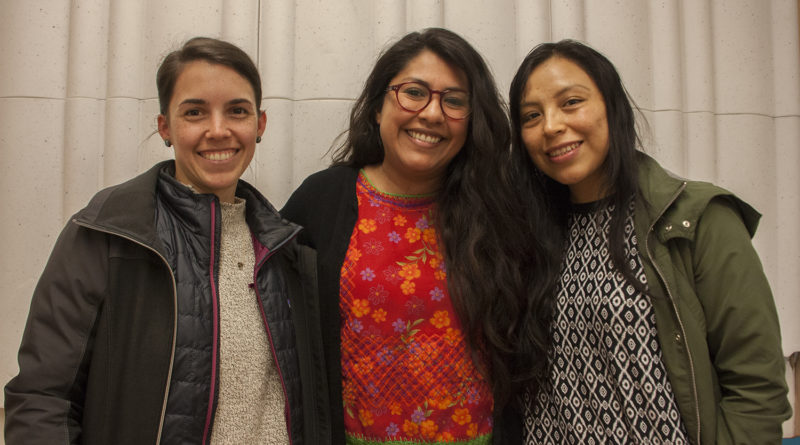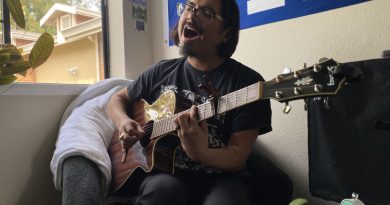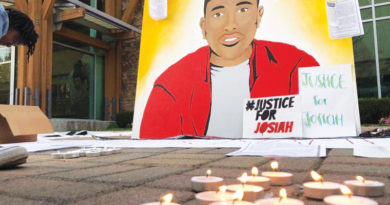Charlando Con La Raza recognizes Latinx Community and Culture
Above the trees and in the sky, radio waves carry the sounds of people, and in those voices are three women advocating for change and awareness for their Latinx community.
Humboldt State University students, Xochitl Cabrera, Brenda Mendoza and Yojana Miraya host Charlando Con La Raza. In November 2017, the three women fell upon an opportunity to host a radio show, and months later their program can be heard throughout Humboldt County and Del Norte County Tuesday nights at 7 p.m., Wednesday mornings at 7 a.m., and Saturday afternoons at 1 p.m. on KHSU 103.3 FM.
“I feel like I am doing something that can lead to change and give awareness, and provide solidarity to those who feel alone here and are very far from their homes”
“I feel like I am doing something that can lead to change and give awareness, and provide solidarity to those who feel alone here and are very far from their homes,” Miraya said. “I feel that talking with them and talking about the struggles they are having is important.”
Origins of the Program
From the creation of the program, the women knew they wanted to discuss the struggles of immigrants and speak on issues that are considered taboo in the Latinx community.
“We don’t realize these things are affecting us until we sit down and have a conversation about them,” Cabrera said.
These topics cover environmentalism, identity, art and expression, immigration and Latinx culture. The show connects ideas they talk about back to social justice and everyday life.
“That’s Charlando Con La Raza because we know these political conversations are tabooed within the Latino/Hispanic communities,” Cabrera said. “You don’t really have that freedom to speak. Which is why we are, like, how do we address these political issues, but in a way that people listen.”
The establishment of Charlando Con La Raza became a part of KHSU after Radio Bilingüe, a national Latino public radio network, was brought to HSU.
According to Jessica Eden, producer of shows like Charlando Con La Raza, for years people had been talking about getting Spanish language radio here in a more sustained way. Although there have been several broadcast relays from other Spanish programs, none have been based in the local area.
“We knew there was enough energy from the community and enough energy here on campus that people really, really wanted that to happen,” Eden said.
When news arrived that Radio Bilingüe was actually going to happen, Eden knew there needed to be local content.
Eden wanted to demonstrate to their boss at the radio station, and to HSU administration that this was something of importance.
Even by having a satellite feed from Fresno, California airing Radio Bilingue, it would not be enough. So, to demonstrate the desire and energy for Spanish language radio, Eden reached out to students to be part of the movement.
“Honestly, I feel from the very beginning they had a feel for the medium,” Eden said. “Their honesty has been the most profound thing for me. I think it is something we are missing from our dialogues in the media.”
Sanctuary Ordinance
Recently, the women have used their show as a medium to advocate for the sanctuary ordinance in Humboldt County. They’ve spoken on the importance of the initiative for migrants. and stepped out onto the streets to gather signatures alongside the organization Centro del Pueblo.
The ordinance would prevent local sheriffs or county employees from aiding federal immigration enforcement unless it is necessary under certain laws such as serious crime cases, according to an article published in the Times Standard. The first step for them would be to collect 4,000 signatures so that the initiative is placed on the voting ballot. Mendoza said they have collected a little over 2,900 signatures around the county.
According to Mendoza, they have received mixed reactions from the community after they promoted the sanctuary ordinance.
“Some of the people are very supportive and are progressive, but some other sectors are very conservative and they show open rejection,” Mendoza said.
When Mendoza and Miraya gathered signatures in Ferndale and Fortuna, they felt that it was tough and described the towns as conservative places in Humboldt County.
“It’s easy to be brave on the radio,” Mendoza said. “No one sees us, but in the streets people see what you are. You are exposing yourself.”
She said that she has to remind herself that those intense reactions are not against her, but rather themselves and their own mentality.
“I can sense that there is less conscience,” Miraya said. “They are not aware of what’s going on in Humboldt County.”
Miraya said people with such strong perspectives tend not to be open to new ideas. Even explaining what Centro Del Pueblo did and the sanctuary ordinance can be difficult since they refuse to listen.
However, sometimes they get people who do stop and listen. Mendoza said that when that occurs, that’s the moment that gives her hope.
Mendoza said that in Latin America most people don’t believe in institutions, or at least in Mexico. But here in the United States people respect laws and norms. Everything is well regulated and its different.
“I see law here as a place of power,” Mendoza said. “Yes, we can change things through laws.”
The experiences that Mendoza, Miraya, and Cabrera witness and feel, find their way onto Charlando Con La Raza. The show is a tool for them to educate, share, and advocate for their community.
“The radio is very important, it’s a power,” Miraya said. “Knowledge is power.”






